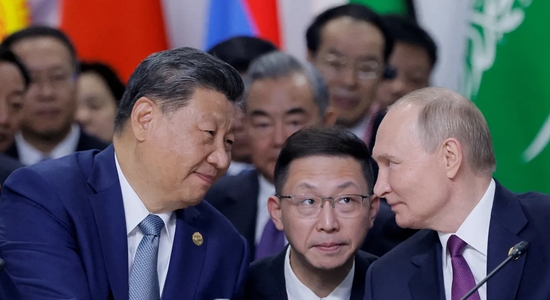
Can we pry China away from the others?
In Foreign Affairs, Stephen Hadley argues that “The Right Way to Thwart the New Autocratic Convergence” of China, Iran, North Korea, and Russia is to convince China, the leading partner, that it cannot actually serve its interests by tethering itself to these other autocracies (“Xi Jinping’s Axis of Losers,” November 1, 2024). The article provides an outline of what could be a book’s worth of argumentation.
Cooperation among the members of this twenty-first-century axis has been heavily centered on military, industrial, and economic support for Russia in its war on Ukraine, which could not be sustained without such help….
China is so far providing [Russia with] everything short of actual weapons: dramatically increased trade and purchases of oil, gas, and other natural resources; dual-use technology that is being integrated into Russian air-defense, electronic-warfare, drone, and other weapon and communication systems; and as of recently, actual components for Russian weapons. There is even talk of producing drone and weapon systems for Russia in Chinese factories. What China is getting in return is not fully clear at this point, aside from discounted energy—and potentially unrivaled influence over Russia….
What truly binds the axis is not ideology but a common opposition to U.S. power and the international system it sustains—fueled by a belief that this power represents a mortal threat to their regimes’ interests, aspirations, and even survival….
More fundamentally, China has made its prestige hostage to the success of its axis partners. If they should be seen to be failing in their respective efforts to impose their will on their neighbors by force, it would become clear to the world that Beijing has cast its lot with losers….
With respect to Russia, it means preventing Putin from achieving his strategic objectives in Ukraine….
By decisively curbing the adventurism of his axis partners, Washington could cause Xi to change course once again. It would surely be in his interest to do so. For if the recklessness of his partners brings sustained global instability and conflict, Xi himself would bear much of the blame for preventing the Communist Party from fulfilling its pledges to make China a “moderately developed economy” by 2035 and a “strong, democratic, civilized, harmonious, and modern socialist country” by 2049. The right U.S. strategy could make Xi understand that he can best serve his own interests by breaking with the axis of losers.
China is certainly collaborating with the listed autocracies in the listed ways. It’s unclear why the author contends that it’s not so much ideology as opposition to the U.S. and its “international system” that sustains these thug-partnerships. These are not two mutually exclusive sets of considerations.
Why would the thug-countries regard this system as a threat? Perhaps it has something do with the extent to which its assumptions and policies are distinguishable from their own autocratic (or more autocratic) assumptions and policies. Maybe the opposition to the West and its international system has something to do with ideology, philosophy, culture.
We can all agree that it would be a good thing to thwart the predatory ambitions of China’s thug-partners. We can start by not actively abetting them, as the West so often does these days by, for example, sending pallets of cash to Iran, aid packages to Hamas, or whichever. But would abstract concerns about “prestige,” alone, really cause Xi et al. to retreat from helping their murderous fellow troublemakers to cause more trouble?
And let’s say that the West, surmounting all suicidal politics and other obstacles, enjoys some success in clobbering China’s partners. Must the long-run effect of this success be that the Chinese Communist Party autocrats now more effectively achieve their goals for China? Goals that, regardless of the rhetoric, are far from benign?
Do we really want to help Xi understand “how he can best serve his own interests,” given how he views his interests?
For details and answers to these and other questions, I guess we’ll have to wait for the book, if there will be one.
Also see:
StopTheChinazis.org: “China Is Stoking a New Cold War With the West”





